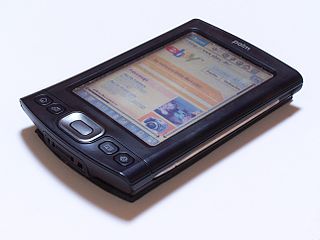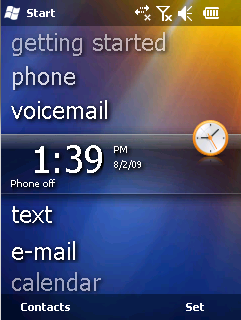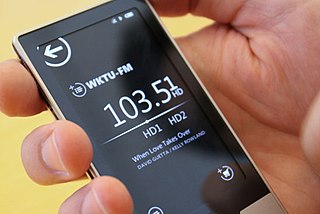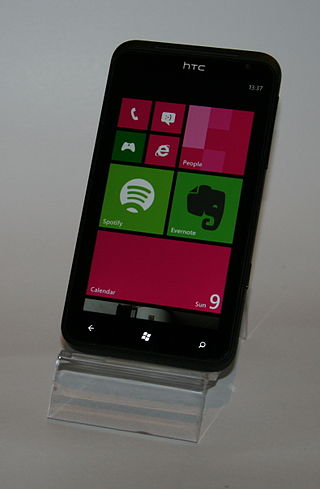
A personal digital assistant (PDA) is a multi-purpose mobile device which functions as a personal information manager. Following a boom in the 1990s and 2000s, PDA's were mostly displaced by the widespread adoption of more highly capable smartphones, in particular those based on iOS and Android in the late 2000's, and thus saw a rapid decline.
Windows Media Audio (WMA) is a series of audio codecs and their corresponding audio coding formats developed by Microsoft. It is a proprietary technology that forms part of the Windows Media framework. WMA consists of four distinct codecs. The original WMA codec, known simply as WMA, was conceived as a competitor to the popular MP3 and RealAudio codecs. WMA Pro, a newer and more advanced codec, supports multichannel and high-resolution audio. A lossless codec, WMA Lossless, compresses audio data without loss of audio fidelity. WMA Voice, targeted at voice content, applies compression using a range of low bit rates. Microsoft has also developed a digital container format called Advanced Systems Format to store audio encoded by WMA.

Palm OS is a discontinued mobile operating system initially developed by Palm, Inc., for personal digital assistants (PDAs) in 1996. Palm OS was designed for ease of use with a touchscreen-based graphical user interface. It was provided with a suite of basic applications for personal information management. Later versions of the OS were extended to support smartphones. The software appeared on the company's line of Palm devices while several other licensees have manufactured devices powered by Palm OS.

A Pocket PC is a class of personal digital assistant (PDA) that runs the Windows Mobile or Windows Embedded Compact operating system that has some of the abilities of modern desktop PCs. The name was introduced by Microsoft in 2000 as a rebranding of the Palm-size PC category. Some of these devices also had integrated phone and data capabilities, which were called Pocket PC Phone Edition. Windows "Smartphone" is another Windows CE based platform for non-touch flip phones or dumber phones.

Palm is a now discontinued line of personal digital assistants (PDAs) and mobile phones developed by California-based Palm, Inc., originally called Palm Computing, Inc. Palm devices are often remembered as "the first wildly popular handheld computers," responsible for ushering in the smartphone era.
Windows Embedded Compact, formerly Windows Embedded CE, Windows Powered and Windows CE, is a discontinued operating system developed by Microsoft for mobile and embedded devices. It was part of the Windows Embedded family and served as the foundation of several classes of devices including the Handheld PC, Pocket PC, Auto PC, Windows Mobile, Windows Phone 7 and others.

RealPlayer, formerly RealAudio Player, RealOne Player and RealPlayer G2, is a cross-platform media player app, developed by RealNetworks. The media player is compatible with numerous container file formats of the multimedia realm, including MP3, MP4, QuickTime File Format, Windows Media format, and the proprietary RealAudio and RealVideo formats. RealPlayer is also available for other operating systems; Linux, Unix, Palm OS, Windows Mobile, and Symbian versions have been released.

Windows Mobile is a discontinued mobile operating system developed by Microsoft for smartphones and personal digital assistants.

Internet Explorer Mobile was a mobile version of Internet Explorer developed by Microsoft, based on versions of the MSHTML (Trident) layout engine. IE Mobile comes loaded by default with Windows Phone and Windows CE. Later versions of Internet Explorer Mobile are based on the desktop version of Internet Explorer. Older versions however, called Pocket Internet Explorer, are not based on the same layout engine.
The Palm Treo 700w is a Windows Mobile-powered smartphone that was officially announced on September 26, 2005. As Palm's first Windows Mobile-powered Treo, the 700w offered an alternative for users who want or need to use Microsoft software. It was offered by Verizon Wireless, and other CDMA carriers. A newer version of this phone has been released, the Treo 700wx.
CoreAVC was a proprietary codec for decoding the H.264/MPEG-4 AVC video format.

Zune was a brand of digital media products and services that was marketed by Microsoft from November 2006 until it was discontinued in June 2012. Zune consisted of a line of portable media players, a music subscription service known as Zune Music Pass plus Zune Marketplace for music, TV and movies, streaming services for the Xbox 360 game console, and the Zune software media player for Windows PCs which also acted as desktop sync software for Windows Phone.

Opera Mobile is a mobile web browser for smartphones, tablets and PDAs developed by Opera.

Zune is a discontinued software program that was developed by Microsoft for Windows that functions as a full media player, library, media streaming server, mobile device management, and interface for the discontinued Zune Marketplace. The software is used to sync with all devices with Zune functionality including the Zune 4, 8, 16, 30, 80, 120, Zune HD, Windows Phone 7, and Microsoft Kin. Zune devices work exclusively with the Zune software, which applies many design principles of Microsoft's Metro design language.

Windows Mobile Device Center is a synchronization software program developed by Microsoft, and the successor to ActiveSync. It is designed to synchronize various content including music, video, contacts, calendar events, web browser favorites, and other files between Windows Mobile devices and the Microsoft Windows operating system.

The Palm Foleo was a planned subnotebook computer that was announced by mobile device manufacturer Palm Inc. on May 30, 2007, and canceled three months later. It intended to serve as a companion for smartphones including Palm's own Treo line. The device ran on the Linux operating system and featured 256 MB of flash memory and an immediate boot-up feature.
Kinoma, a division of Marvell Semiconductor, is a software engineering group providing an open-source, cross-platform ECMAScript stack aimed at developing software for Internet of Things products and other embedded devices. Additionally, Kinoma provides Kinoma Create, a hardware prototyping platform aimed at the independent maker community.

Ovi was the brand for Nokia's Internet services from 2007 to 2012. It was designed to be an umbrella brand as Nokia attempted to expand into software and Internet services instead of just mobile hardware. Ovi focused on five key service areas offered by Nokia: Games, Maps, Media, Messaging and Music.

The Zune HD is a portable media player in the Zune product family released on September 15, 2009, by Microsoft. It was a direct competitor with Apple's iPod Touch series of mobile devices. It was initially released in 16 and 32 GB capacities. A 64 GB version was released on April 9, 2010. It has a touchscreen interface for navigation and included Wi-Fi for synchronization, access to the Zune Marketplace and Web browsing.

Windows Phone 7 is the first release of the Windows Phone mobile client operating system, released worldwide on October 21, 2010, and in the United States on November 8, 2010. It runs on the Windows CE 6.0 kernel.











